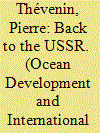| Srl | Item |
| 1 |
ID:
191902


|
|
|
|
|
| Summary/Abstract |
This article analyzes the consequences of the recently declassified Soviet decree No. 331-112 of 27 April 1965 that established, inter alia, the status of the Soviet Arctic straits along the Northern Sea Route with respect to warships’ right of innocent passage. This article argues that the decree, read in conjunction with Article 5.2 of the 1958 Convention on the Territorial Sea and Contiguous Zone and Article 8.2 of the United Nations Convention on the Law of the Sea, establishes a right of innocent passage through the majority of the Russian Arctic straits, which warships can enjoy. Furthermore, this article asserts that the decree calls into question the existence of a customary regime regulating navigation through the Arctic straits.
|
|
|
|
|
|
|
|
|
|
|
|
|
|
|
|
| 2 |
ID:
191901


|
|
|
|
|
| Summary/Abstract |
China and South Korea resumed negotiations on delimiting their maritime boundary in 2015. The overlapping maritime area of China and South Korea requiring delimitation lie mainly in the South Yellow Sea (SYS). This article proceeds on the basis that the two states probably reached a preliminary agreement on the limits of the first-stage maritime delimitation area, in which there are no third-party interests involved. This article selects 37°N and 32°N as the northern and southern limits of the first-stage maritime delimitation area on the basis of public information available. This article proposes that China and South Korea can delimit a single maritime boundary for their exclusive economic zones (EEZs) and continental shelves by applying the equidistance/relevant circumstances method, and then following the three-stage approach. After applying the three-stage approach to this case, this author concludes that the adjusted equidistance line/potential delimitation line will probably move toward South Korea, departing from the provisional equidistance line. The potential delimitation line of EEZ/continental shelf between the two states probably extends generally south-southwest-southeast. This author calculates that the coastal length ratio between the two states is approximately 1:2.14 in favor of China and the ratio of the relevant baselines length is approximately 1:1.47 in favor of China. This author deduces that the ratio of the allocated relevant areas is approximately 1:1.17 in favor of China and the ratio of the allocated provisional measure zone (PMZ) of the 2000 China–ROK Fishery Agreement is approximately 1:1.44 in favor of China, both under the adjusted equidistance line scenario, measured by the WGS 1984 Web Mercator.
|
|
|
|
|
|
|
|
|
|
|
|
|
|
|
|
| 3 |
ID:
191900


|
|
|
|
|
| Summary/Abstract |
In the 2021 Mauritius/Maldives (preliminary objections) case, the Special Chamber of the International Tribunal for the Law of the Sea (ITLOS) rejected Maldives’ first and second preliminary objections to jurisdiction, which were based on the Monetary Gold principle. However, the Special Chamber’s reasoning regarding the Monetary Gold principle in this case is questionable. This article discusses the application of the principle in this case. After introducing the background to the maritime delimitation dispute between Mauritius and Maldives, this article explores the evolving jurisprudence of the Monetary Gold principle and its constitutive elements. It goes on to analyze the application of the Monetary Gold principle in the Mauritius/Maldives case and criticizes the Special Chamber’s approach, arguing that the Maldives’ first and second preliminary objections should have been upheld.
|
|
|
|
|
|
|
|
|
|
|
|
|
|
|
|
| 4 |
ID:
191903


|
|
|
|
|
| Summary/Abstract |
This article examines how flag states, port states, and the shipping industry have attempted to fulfill their obligations to carry out mandatory ship surveys and certification in response to challenges arising from the COVID-19 pandemic and provides guidance for future pandemics. Although the International Maritime Organization (IMO) Conventions do not have procedures to deal with the impacts of global pandemics on ship surveys and certification, the IMO has provided guidance via circular letters, taking a pragmatic and practical approach. Several flag states extended the validity of certificates by taking either a case-by-case or a blanket approach within the statutory maximum of three months. With regard to the extension beyond the statutory period of three months, flag states should consider requests using an evidence-based assessment on a case-by-case basis. Classification societies play an important role in the extension of the validity of certificates by providing their technical expertise and recommendations. Port state control serves as a safety net in the event that flag states do not comply with their obligations. In this regard, cooperation between flag states, port states, and classification societies is key to managing survey and certification during a pandemic. Moreover, the COVID-19 pandemic has demonstrated an accelerated need for the development of remote surveys. It has also illustrated a need to develop guidance on remote surveys under exceptional circumstances in order to respond to future pandemics.
|
|
|
|
|
|
|
|
|
|
|
|
|
|
|
|